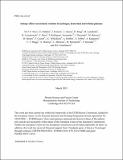Isotope effects on intrinsic rotation in hydrogen, deuterium and tritium plasmas
Author(s)
Nave, M.F.F.; Delabie, E.; Ferreira, J.; Garcia, J.; King, D.; Lennholm, M.; Lomanowski, B.; Parra, F.; Rodriguez Fernandez, Pablo; Bernardo, J.; Baruzzo, M.; Barnes, M.; Casson, F.; Hillesheim, J.C.; Hubber, A.; Joffrin, E.; Kappatou, A.; Maggi, C.F.; Mauriya, A.; Meneses, L.; Romanelli, M.; Salzedas, F.; JET contributors; ... Show more Show less
Download23ja045_full.pdf (1.337Mb)
Metadata
Show full item recordAbstract
The isotope effect on intrinsic rotation was studied at the JET tokamak. With the unique capability of JET to operate with Tritium, for the first time, experiments in Hydrogen, Deuterium and Tritium in ohmic plasmas were compared. Two rotation reversals per isotope type are observed in plasma density scans spanning the linear and the saturated Ohmic confinement regimes. A clear isotope mass dependence is observed at the higher densities. The magnitude of the core rotation was found to depend on isotope mass, with stronger co-current rotation observed in hydrogen. Change on intrinsic rotation characteristics coexist with a stronger thermal energy confinement in Tritium.
Description
Submitted for publication in Nuclear Fusion
Date issued
2023-03Department
Massachusetts Institute of Technology. Plasma Science and Fusion CenterJournal
Nuclear Fusion
Publisher
IOP
Other identifiers
23ja045